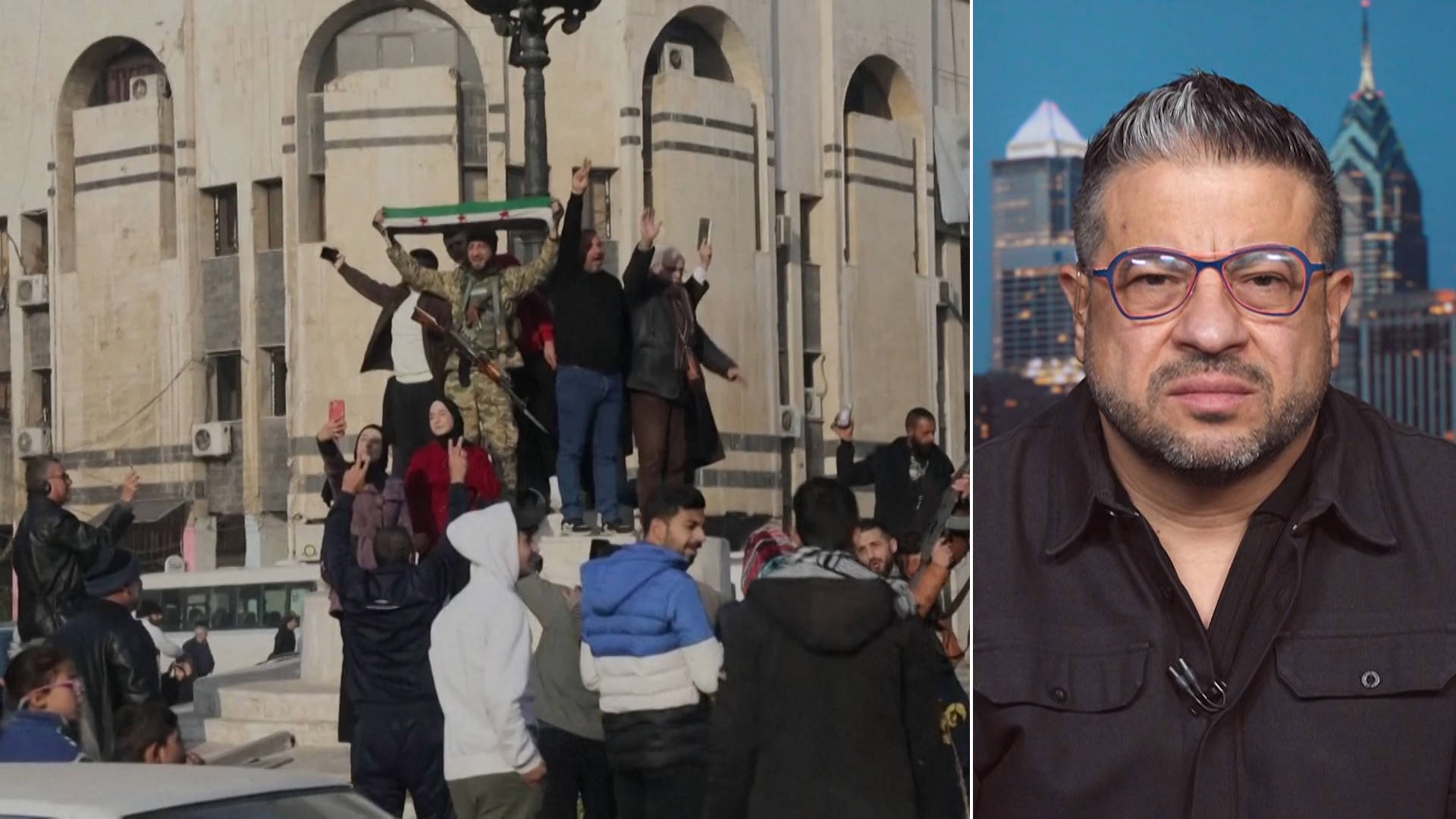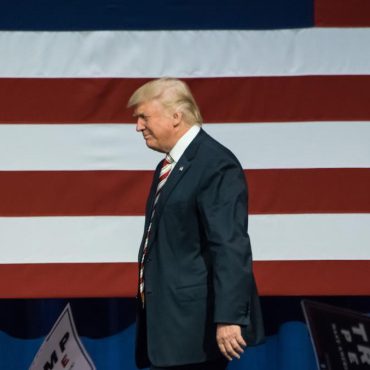This is a rush transcript. Copy may not be in its final form.
AMY GOODMAN: This is Democracy Now!, democracynow.org, The War and Peace Report. I’m Amy Goodman, as we continue to look at how the Assad family has lost control of Syria after more than half a century of brutal dictatorship, following a rapid advance of rebel fighters. Today, U.N. Security Council will hold an emergency meeting on Syria. The U.N. Syrian envoy, Geir Pedersen, said an inclusive transitional government is needed to restore a unified Syria.
GEIR PEDERSEN: All armed actors on the ground maintain good conduct, law and order, protect civilians and preserve public institutions. Let me urge all Syrians to prioritize dialogue, unity and respect for international humanitarian law and human rights as they seek to rebuild their society.
AMY GOODMAN: Israel responded to the Syrian uprising by invading and seizing parts of Syria’s Golan Heights in violation of a 1974 agreement with the Syrian government. Israel also bombed a number of areas, including a Syrian air base and weapons depots. Israeli Prime Minister Benjamin Netanyahu said Sunday the collapse of Bashar al-Assad’s regime in Syria was a “direct result” of Israel’s military campaign against Hezbollah in Lebanon.
PRIME MINISTER BENJAMIN NETANYAHU: [translated] This is a historic day in the history of the Middle East. Assad’s regime is a central link in Iran’s Axis of Evil. This regime has fallen. This is a direct result of the blows we inflicted on Iran and Hezbollah, the main supporters of the Assad regime. This created a chain reaction throughout the Middle East.
AMY GOODMAN: Meanwhile, the United States carried out dozens of airstrikes inside Syria targeting areas held by the Islamic State. And in northern Syria, Turkish-backed armed groups have seized the city of Manbij, which had been controlled by U.S.-backed Syrian Kurdish forces.
For more, we go to Philadelphia, where we’re joined by Bassam Haddad, associate professor at George Mason University, author of Business Networks in Syria: The Political Economy of Authoritarian Resilience. He’s the co-founder and editor of the Jadaliyya ezine and is executive director of the Arab Studies Institute at George Mason University. His forthcoming book, Roots, Dynamics, and Transformation of the Syrian Uprising.
Professor Haddad, first, your response to what took place this weekend?
BASSAM HADDAD: Thank you, Amy. It’s good to be with you again.
The first thing I’d like to say is that there are so many more questions than answers, so it’s important — especially today, so it’s important to keep that in mind as we go along. I would like to be analytical, but there is no way to avoid the importance and the value of watching what happened and what it means, the collapse of the regime after 54 years — or 71, if you want to consider the Ba’athist rule — what it means to ordinary Syrians who have actually been living under this regime for so many decades.
It is a moment that if you look at all the news, that cannot be overlooked and cannot be trumped by analysis of the bigger picture at this very moment, although the bigger picture is grim, is very problematic, and it’s really important for us to get to it, and I hope we can get to it today. But it is not something that we could underestimate, given the brutality of the regime, not least its lack of ability completely to govern in the past several years, at least after 2019, 2020, and its inability to provide the infrastructure, social services and the basic needs for its people, which actually did play a role in the very rapid march of Hayat Tahrir al-Sham into all of the major cities of Syria.
AMY GOODMAN: Explain HTS, its history, and Julani, its leader, and what you’re most concerned about right now.
BASSAM HADDAD: Well, you know, Hayat Tahrir al-Sham is a coalition of a lot of groups, primarily Jabhat al-Nusra,which everyone loves to say it’s al-Qaeda-affiliated, although there’s been some sort of break. Nonetheless, it is what it is. As Yassin al-Haj Saleh said, he is worried about the ideology of HTS and some of the potential consequences. And if Yassin al-Haj Saleh is worried about HTS, where Yassin al-Haj Saleh called Hezbollah thugs, you can imagine what — or, how worried everyone else is about the future. But we will get to that.
HTS has actually acted in a manner that is not alone. HTS cannot move out of Idlib and could not have moved out of Idlib without Turkish approval. And even the Turkish government cannot make this decision alone. So, the question is: Who did Turkey connect with, coordinate with, to produce this issue or this campaign or this operation? The second question is: Were there any connections between the ceasefire in Lebanon and what Turkey did today or 10 days ago or right before the coordination took place or around then? And what kind of also coordination took place between Turkey and Russia, as well as between Russia and the potential group HTS and otherwise? Because they apparently, from recent reports, they have actually allowed the Russians to keep their air base. This has to be checked. So, there are a lot of questions.
And I wanted to insist again that at this point, although we can keep going and talk about the regional and global implications, which are not good, but I would like to insist on seizing this moment to recognize what it means for millions of Syrians who are actually very happy that this has happened. Many others are concerned, including those who are actually celebrating. They are concerned about the future. They’re concerned about how this took place, where this is going to go, who’s going to be in the lead. And many are concerned about what this means to the expanding, global, superpower, imperialist, American-Israeli hegemony, domination in the region, in the absence or far weakened, what we call, the Axis of Resistance. This is not a small issue, and it will become part of the major headlines very, very soon.
AMY GOODMAN: Talk more about this. What would — the amount of Syrian participation in reshaping Syria, will that be challenged because of the international support Syria will need to rebuild, that will include the U.S., players like the Gulf Arab monarchies? Turkey will also be, as you pointed out, and already is, deeply involved. Will that push what happens to Syria in a certain direction?
BASSAM HADDAD: Again, I must reiterate the importance of having so many questions with very, very few answers, because we do not know exactly how this was coordinated and with whom and what are the trade-offs that have actually already been in place.
But it’s going to be a phase, the next phase — or, this current phase is actually not the phase that we can focus on, because, according to the best analysis, the current configuration is not going to be transferred into the next phase. The political and economic and the military configuration today, the people that actually have the guns and are in control, are not likely themselves alone, maybe part of a coalition, a bigger coalition, a more diverse coalition, but not alone, move forward.
There’s so much trepidation in Syria. There’s so much trepidation in Turkey, by the United States, by many of the Arab states that are powerful and will probably be somewhat relied on to help rebuild Syria, about the singularity of a particular group, HTS, and how it need not and should not be the only player in the field. But the questions right now are just that. It’s very difficult to recognize where things are going.
But we do know that the United States and Israel are extremely comforted. Israel, yesterday on Channel 13, called what happened an “accomplishment.” And this “accomplishment” is something that will allow Israel to move forward with its genocide on Gaza, along with the United States. The United States is not just complicit; it’s a full partner in this genocide. And much bigger issues will come to fore in the coming weeks.
And the jubilation, while it’s important today for the people who have been under the boot of the regime — and we cannot underestimate this, no matter how concerned you are about imperialism and global political economy and so on. This has to be recognized, because one of the things that will actually cause me trouble and will cause my phone to blow up in just a few minutes by my own friends is that a lot of people who overemphasize the question of imperialism on a day like this or on a week like this, unfortunately, unwittingly, make the Syrian people invisible, as if they are not important and only global power politics is. And that is something that I would like to caution against.
Despite the fact that, yes, we can analyze that what has just happened is a triumph for global power, like the United States, for imperial designs, for conservative Arab states in the region, for normalizers in the region, and certainly for Israel or anyone who would like to weaken any sort of resistance — forget even Iran and Hezbollah — in the region to these kinds of plans that are not just about land theft and political domination, but also about economic plans and prescriptions that will disempower the working classes in the region and continue to do so.
AMY GOODMAN: Can you talk more about HTS and whether you believe it will be one of the leading partners in a new Syria, its background, its running of Idlib, how Idlib, that whole area, was run?
BASSAM HADDAD: I mean, honestly, HTS, first of all, wasn’t in complete control of Idlib. It was the dominant power in Idlib. There are various groups in Idlib that were actually also somewhat powerful. HTS has been able to govern, for the most part.
It is not likely that HTS will ever singularly rule Syria. This is something on which there is regional and international consensus, if not even domestic consensus. Despite everything that we have seen, Syrian society is among the most secular of Arab societies. And even if affinity with conservatism in Islam has grown considerably in the past few years or decades or even more, there is no appetite for what HTS has been advocating for, including its recent — recent as in in the past several years or in 2014, ’15, ’16 — a sort of discourse that is exclusionary. Now it says it’s repudiating this discourse. Now it’s actually trying to make sure that its forces do not repress, although what we have seen in many parts of Syria are various forms of exclusion, destruction of alcohol stores, burning of Christmas trees and things of the sort, that supposedly HTS has repudiated and tried to correct the path. This new vision or approach of HTS is interesting. It’s probably also coordinated with those who gave it the carte blanche to move forward. In all cases, the HTS is not the kind of apple pie that — well, in Syria, it won’t be apple pie, it’ll be knafeh — that Syrians are looking for.
And in the very, very near future, as the new government is established, as the new military formula is formed and reformed, we will discover that there will be attempts to broaden the coalition and potentially also avoid the horrible mistake that the United States did after its fraudulent and brutal invasion of Iraq in 2003, which is to completely dismantle the state, the ruling party, the army and so on, because that had created the kind of chaos that actually ended up being counterproductive for the invading power and beyond. So, I think it will be a different path than we have seen in Iraq. It will also be a more difficult path, because Syria does not possess the kind of resources like Iraq’s oil at least, or part of it, because it’s not all within the control of the government right now.
So, Syria will have an even more challenging future, economically, socioeconomically and politically. And what I fear is that within a short period, Syria will be off the news, and we will see what I was talking about earlier, the analytical framework of what that means to the region, quite soon actually, as developments take place.
AMY GOODMAN: Well, Bassam Haddad, we want to thank you for being with us. Of course, we’re going to continue to follow this, founding director of the Middle East and Islamic Studies Program at George Mason University. We will link to your work at democracynow.org.
When we come back, we go to London to speak with the Syrian filmmaker Waad Al-Kateab, director of the acclaimed documentary For Sama, for which she filmed hundreds of hours of footage in her native Aleppo to show life during the Aleppo uprising. Stay with us.











Post comments (0)